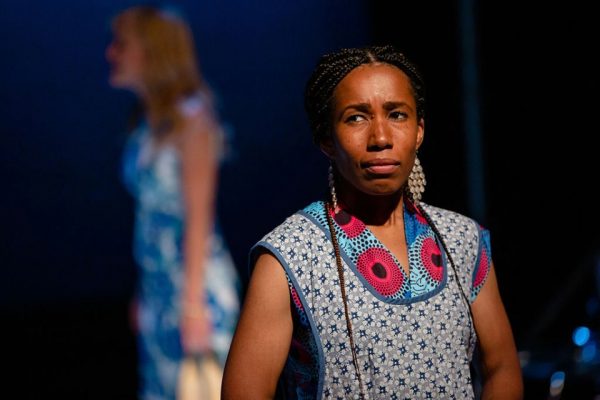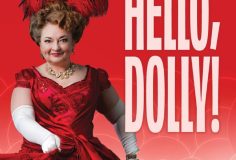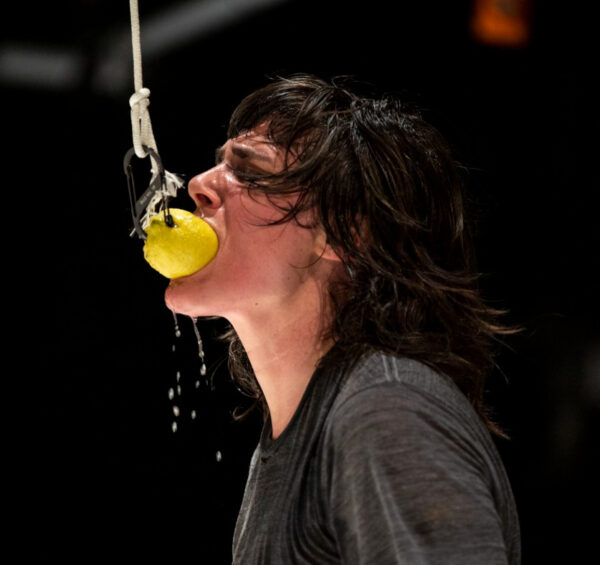Review: PASS OVER by Antoinette Nwandu. Produced by ACT. Directed by Tim Bond. Scenic Design by Julia Hayes Welch. Costume Design by Ricky German. Lighting Design by Andrew D. Smith. Sound Design by Sharath Patel. With Treavor Lovelle, Preston Butler III and Avery Clark. Onstage at ACT from May 31 to June 23, 2019.
Antoinette Nwandu’s astonishingly bold PASS OVER is her breakout play, after years of studying and crafting other work, the May 2017 premiere of the work at Chicago’s Steppenwolf Theatre changed her life. The play received mostly rapturous reviews (with a major exception; more on that in a moment) while bringing her to the attention of not only the national theater making community but beyond that…filmmaker Spike Lee fell in love with the play and filmed that Steppenwolf production and subsequently gave Nwandu a job writing for his television series, She’s Gotta Have It.
The play has gone on to productions in NYC and is now making its way to professional theater companies around the country, including ACT which is producing the play with staging by Tim Bond, during the month of June. And, this production lives up to Ms Nwandu’s bold and artistically compelling script. In a nutshell, it’s the playwright’s take on Samuel Beckett’s classic play Waiting for Godot, about a pair of homeless men existentially waiting for a man named Godot to appear at a lonely crossroads but also for…well, what? Life? Fate? Existence? Pass Over riffs on that material (while also bringing in a bit of the Bible via Moses) but replaces the two middle aged homeless (usually) white men with two very young urban black men named “Moses” and “Kitch” and poses them contemplating similar concerns as they wait, endlessly, on a derelict urban street corner but mostly concerned with avoiding being killed by the “popo” aka the Police. Like Beckett’s work, this play uses repetitive scenes and clever wordplay, though in Ms Nwandu’s version the most frequently used word is a variant of the “N word” constantly used by the two men to refer to one another.
And, as in “Godot” the mood of this work changes when a 3rd character appears: a weirdly perky but also menacing white man dressed rather comically in a natty summer outfit and carrying a picnic basket full of food and drink. Moses and Kitch are both rightfully suspicious of the stranger; not just for his odd look and behavior but also because of what he is: a seemingly benign white man who still manages to convey a tone of privilege and contempt under the cheery but fake banter of a “nice guy”. And, even after the two men warily accept his food and drink, that suspicion is born out when the man declares that his name is “Mister” (= Master) before he eventually leaves.
Moses and Kitch are thankful that encounter got off without anything too traumatic happening but their terror is palpable when a 4th character turns up (played by the actor who plays Mister); it’s a menacing looking “popo” named “Ossifer”. The encounter is relatively calm when Moses and Kitch manage to convince the officer (get it? Ossifer = Officer) they’re a benign presence on this corner but Ossifer eventually turns on them and the situation is increasingly tense.
The play continues with Moses and Kitch on that corner and things get…cyclical as situations start repeating themselves but eventually terrible things do happen….which is what frequently happens to young black men on urban street corners. Eventually, there WILL be blood, on that pavement.
Now, I know some people are going to read this description and…roll their eyes? Tune out once racial “stuff” gets mentioned. Stop reading once they hear “it’s a take on Samuel Beckett’s Waiting for Godot” and…fine. That’s your choice. A dumb choice, but we all want to see what we want to see or think, or more accurately, DON’T think what we refuse to think. Which is what happened with the notorious review by a longtime Chicago theater critic who criticized the Steppenwolf production by protesting that the play wasn’t fair to the police and “what about black on black crime?”
Which has…what to do with THIS play?
The tone deaf, white, female theater critic was criticized for her moronic review. She didn’t immediately lose her job but eventually her newspaper “eliminated” that position, though the critic is still reviewing for the PBS station in Chicago. Unfortunately.
So, if “racial stuff” makes you “uncomfortable” I guess you shouldn’t see Pass Over. Though to be honest, if it makes you “uncomfortable” then you are actually JUST the person who SHOULD/NEEDS to see it since you got shit you obviously need to work on. If you reject the idea that young black men in particular have every reason to be fearful of the police, then you’re not paying very careful attention to the world around you.
But, beside the messages in the play, Pass Over is very much worth seeing for the beauty of its words and the immense power of Antoinette Nwandu’s skills at at crafting this piece of theater. Tim Bond has done an excellent job of staging this work in the Allen Theatre, a rare example where a director has successfully staged a piece of theater in the round and on Julia Hayes Welch’s simple but highly evocative street corner set and well lighted by Andrew D. Smith.
There’s also this glorious cast with two perfectly matched performances by Treavor Lovelle as the more assured Moses and Preston Butler III as the easy go lucky Kitch. It’s like watching two superb artist/athletes work in perfect tandem. And, Avery Clark is appropriately menacing albeit in two VERY different ways as the creepily grinning “Mister” and the stormtrooper-ish “Ossifer”.
Pass Over is a great work of theater art. It’s also a topical one with ideas we should be thinking/talking/doing something about.
What are YOU waiting for?

Beth DeVries as Cindy (background) and Anjelica McMillan as Neni in Book-It’s adaptation of BEHOLD THE DREAMERS. Photo by John Ulman
Review: BEHOLD THE DREAMERS based on the novel by Imbolo Mblie and adapted by Myra Platt. Produced by Book-It Repertory Theatre. Directed by Myra Platt. Scenic Design by Christopher Mumaw. Lighting Design by Emily W. Leong. Costume Design by Danielle Nieves. Sound Design by Justin Johnson. With Marcel Davis, DJ Dell, Beth DeVries, Bailey Ellis, Kamaria Hallums-Harris, Ronnie Hill, Sylvester Foday-Kamara, Anjelica McMillan, David Quicksall, Elijah Savage, Selena Whitaker-Paquiet, Jonas Winburn. Onstage June 6 through June 30, 2019 at Center House Theater/Seattle Center.
For decades, the theater and film and television told stories about immigrant families and their lives in the wonderful land of America, where the streets are paved with gold and opportunities abound. And, these stories mostly followed the lives of the various waves of immigrants beginning in the 19th century…the Irish and the Germans early on followed by Italians and Jews and Scandinavians.
Mostly missing from those tales were ones about Asian immigrants and of course the enforced slavery of Africans. Those stories were mostly ignored, at least until the mid 20th century. Finally, today in the 21st century, more and more immigrant’s lives are being told featuring stories from non-European viewpoints. South Asian and Middle Eastern and even contemporary African immigrants are having their stories told, as in the 2016 novel, Behold the Dreamers by Imbolo Mblie about a pair of families in New York City circa 2008: the recent immigrants from Cameroon, the Jonga family and the white wealthy Edwards family who eventually employ both of the Jongas. The book was a success, getting picked to be part of Oprah’s Book Club, and drew the attention of Book-It Theatre’s co-founder Myra Platt who has adapted the book for the stage and directed it.
The story mostly focuses on the father, Jende Jonga who at the start of the play is nervously waiting for his job interview with wealthy investment banker Clark Edwards. Jende gets the job as chauffeur and rushes home to tell his ambitious wife Neni who is busy raising their son Liomi while going to college to become a pharmacist. Initially, Jende very much enjoys his job and getting to know the Edwards family. Clark is mostly a good boss to have; not overly demanding and respectful towards his employee. Wife Cindy seems a bit high strung and always worried if she’s getting invited to the “best” high society events while the two Edwards kids are pretty low key, elementary school aged Mighty and the rebellious Vince who wants to reject his parent’s upwardly mobile lifestyle for a “real” life.
Eventually, Neni gets pregnant with their second child and also gets a summer job with the Edwards at their Hamptons summer house as the family maid. She fits in well with the Edwards family; both sons adore her and Cindy even kindly, albeit a bit condescendingly, bestows designer clothing castoffs on her as a gift for her loyalty to the family. However, during the summer, Neni also learns of some Edwards family secrets…such as the fact Cindy struggles with depression over her rough upbringing and now copes with her depression with pills and booze.
Cindy’s problems begin to effect her marriage with Clark who seemingly starts seeing another woman which puts Jende in an awkward position when Cindy demands that Jende spy on Clark and report back to her which creates tensions with Jende’s relationship with Clark. With the 2008 stock market crash and financial upheaval, things change drastically for both the Edwards and the Jongas as downsizing leads to Jende losing his job and then tragedy strikes one of the families. By the end of the play, the American Dreams of both families have drastically changed.
It’s hard to write about Behold the Dreamers without revealing plot details that would be obvious spoilers. I also need to make clear that I’m not familiar with the original novel…I can’t judge if this is a faithful adaptation of the original material or not but being familiar with Book-It’s aesthetic, most of their productions do tend to being faithful, (if not OVERLY faithful) to source material. Which might be one of the many problems with this play. Book-It shows do tend to be on the longer side and one of the crippling issues with Behold the Dreamers: The Play is the fact it’s a long show that unfortunately FEELS very long. I don’t think Ms Platt’s skills as director or book adapter have served her very well here. The pacing is…languid and too deliberate. Part of the problem is the fact so much of the plot takes place in cars, conversations between Jende and his employers but this production never conveys any sense of MOVEMENT to these draggy scenes. Lighting and video projections would have helped immensely here, helping to give some needed speed and tempo to the material. There’s no sense of urgency here… it’s all long conversations that feel static.
And, to be honest, many of the characters aren’t very well established or fleshed out to seem like real people. Really, the only character with any sense of vitality is Neni; she’s the strongest most interesting character in the entire play. Her need to succeed in America, to raise and support her family while improving herself and their lives serves as a great drive to her character arc and to the overall play. She’s the major source of energy and vitality and the only character that seems like she might be more than a character in a novel or play. (The strength of the character can also be attributed to the excellent performance by Angjelica McMillan in that role…she’s just great! Very personable and determined with great energy and huge amounts of stage presence…give Ms McMillan more roles, please, Seattle Theaters!)
Sylvester Foday Kamara brings great charm and sincerity to his role as Jende but…the character doesn’t gel like Neni. Initially, Jende is portrayed as a positive go-getter with huge charisma and vitality but by the end of the play, he’s just…flat. The story takes a turn and the character seemingly gives up very easily without even trying to change the circumstances. I think part of the problem is the writing (and the direction) and it might be in the casting, too. Sylvester Foday Kamara is perfect casting for the Jende of the first half of the play (a winsome, optimistic winner) but not so much for the dreary quitter at the end. He’s too powerful to be believable as a whiny yutz.
As for the Edwards, they never really gel beyond cardboard characters either despite the presence of two strong actors (David Quicksall as Clark and Beth DeVries as Cindy) as the parents. Both are also a bit oddly schizoid in their characterizations. Clark is kinda/sorta a nice guy at times/a jerk at others, though wishy-washy about it. And poor Cindy is just a bit of a cliched mess…the messy socialite with dark secrets and a pill/booze problem is older than “the butler did it!” when it comes to worn out dramatic tropes.
The ensemble cast in support is quite strong here with most of the actors playing several roles. Bailey Ellis does a nice job as the rebellious son, Vince while Kamaria Hallums-Harris and Selena Whitaker-Paquiet were delightful as a pair of Neni’s best friends.
It’s a handsome looking show with some lovely costume work by Danielle Nieves but as I stated up above, the show needed the lighting, sound and visual effects designs to aid in telling all those stories set in vehicles. This show needs more movement and energy.
While I very much enjoyed the Neni character, overall the other characters in Behold the Dreamers failed to engage, mostly compounded by issues with the script and the direction. It’s great to see stories about African immigrants being told, but maybe they need to be told from purely African viewpoints.
And, with better pacing.




















